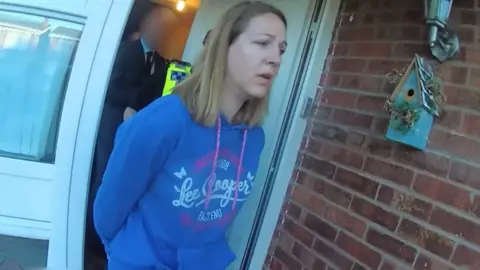 BBC
BBCSerial killer Lucy Letby did not murder any babies, the chairman of a panel of international medical experts has claimed while outlining “significant new evidence”.
Letby, now 35, is serving 15 whole life prison sentences after being convicted of murdering seven babies and attempting to murder seven others.
The 14-strong panel attributed some of the deaths at the Countess of Chester’s neonatal unit between June 2015 and June 2016 to natural causes, and alleged others were due to substandard care.
The study is now likely to form the heart of submissions to the Criminal Cases Review Commission (CCRC) after Letby’s lawyers applied for her case to be investigated as a potential miscarriage of justice.
Former neonatal nurse Letby lost two bids to challenge her convictions at the Court of Appeal last year.
Veteran MP Sir David Davis, who has been assisting Letby’s legal team, described her convictions as “one of the major injustices of modern times”.
The panel, including experts from Canada, the U.S, Japan, Germany, Sweden and the UK, looked at 17 cases at the heart of Letby’s prosecution.
Chair of the panel, retired medic Dr Shoo Lee, who co-authored a 1989 academic paper on air embolism in babies, said the 14 experts had compiled an “impartial evidence-based report”.
Presenting the panel’s case, he added that their thoughts were with the families of the babies who had died.
“We understand their stress and their anguish, and our work is not meant to cause more distress,” he said.
“Rather, it is meant to give them comfort and assurance in knowing the truth about what really happened.”
Dr Lee provided what he said were highly detailed grounds baby-by-baby for concluding that none of the murders occurred.
He added: We did not find any murders. In all cases, death or injury were due to natural causes or just bad medical care.”
“Lucy was charged with seven murders and seven attempted murders”, he said.
“In our opinion, the medical opinion, the medical evidence doesn’t support murder in any of these babies.
“Our full report will go to Lucy’s barrister later this month, and then it’ll be up to him and the courts to decide what next to do.”
Earlier, the CCRC said Letby’s lawyers had applied to the commission to investigate her case as a potential miscarriage of justice.
The CCRC confirmed it had “received a preliminary application in relation to Ms Letby’s case, and work has begun to assess the application”.
A CCRC spokesperson said: “We are aware that there has been a great deal of speculation and commentary surrounding Lucy Letby’s case, much of it from parties with only a partial view of the evidence.
“We ask that everyone remembers the families affected by events at the Countess of Chester Hospital between June 2015 and June 2016.”
The spokesperson said it was not the CCRC’s job to “determine innocence or guilt in a case”, and said that it was a “matter for the courts”.
The body said it would now assess the application and determine whether there was new evidence which presented a reasonable chance of a conviction being overturned.
 PA Media
PA MediaIn Letby’s trial the prosecution referred to evidence a 1989 report by Dr Lee to argue that one of the methods used by Letby was introducing air to the baby’s bodies through intravenous lines.
One of the issues Dr Lee said the panel had found was that skin discoloration noted on some of the babies was, he claimed, wrongly attributed to air embolus by the prosecution.
In May 2024 Letby appealed her convictions for seven murders and seven attempted murders, and in October for one attempted murder of a baby girl which she was convicted of by a different jury at a retrial.
At the first of those appeals, her defence argued fresh evidence from Dr Lee meant the convictions were unsafe.
However those arguments were rejected as three senior judges concluded there had been no prosecution expert evidence diagnosing air embolus solely on the basis of skin discolouration.
 PA Media
PA MediaMark McDonald, Lucy Letby’s barrister, said that because her previous legal team had not called a medical expert at her trial, the information presented was “new, fresh evidence”.
He said the nurse was convicted because of the medical evidence, and if that was wrong any circumstantial evidence would “fall away”.
“The most important thing, the reason why Lucy Letby was convicted, was because of the medical evidence that was presented to the jury that today has been demolished,” he said.


